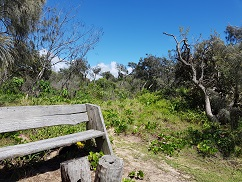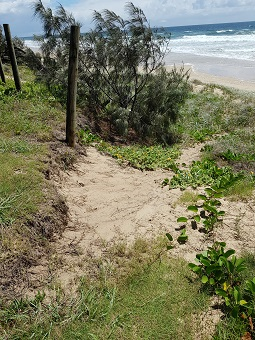
Vegetation damage framed by dying vegetation
Naturally vegetated coast, lake and river foreshores makes a green backdrop to our neighbourhoods, provide wildlife habitat and contributes to community resilience to the immediate and long-term impacts of climate change. Being a good foreshore neighbour
can help keep our foreshores in good condition now and for future generations.

Private beach access trampling erosion
Stay on public paths: Why? Straying from public paths tramples native plants, spreads weeds and causes erosion. Making or using private paths clears and fragments native vegetation, causes erosion, spreads weeds and provides easy movement for foxes and cats.
How? Always use public beach accesses and Council managed paths
Protect native vegetation: Why? Mowing, pruning, cutting, breaking, pulling, poisoning and clearing native foreshore vegetation – including trees, shrubs and ground covers - makes the remaining vegetation more vulnerable to weeds, wind and salt damage. It reduces the dunes ability to protect us from severe weather, reduce erosion and be wildlife habitat.
How? Always contact Council about foreshore vegetation issues and join your local Bushcare group.
Protect the dunes from pets: Why? Dogs in dunes can cause erosion on steep slopes and fragile front dunes and cats and dogs can scare or attack wildlife. Their droppings and scent marking can discourage wildlife, spread disease and make working in the dunes very unpleasant for our bush regenerators and bushcare volunteers.
How? Keep pets out of the dunes and always dispose of droppings in the bin or compost.
Be sea turtle friendly: Why? Sea turtle mothers and hatchlings are easily confused by artificial light on the beach.
How? Protect shielding native vegetation. During the turtle nesting season (November to March) remove lights that shine upwards or out to the sea, replace remaining lights with turtle friendly colours and put lights on timers and sensors. Click here to learn more about Sea Turtles.
Respect your property boundary: Why? Replacing community bushland with private gardens, structures and storage degrades the bush, spreads weeds and blocks emergency and management access. It reduces the width of often already narrow vegetated foreshores.
How? Keep your garden and possessions within your property.
Garden responsibly: Why? Most environmental weeds started out as garden plants, and many will happily spread in bushland. Weeds replace wildlife habitat with just a few non-local species.
How? Remove environmental weeds from your garden and replace with local natives. Monitor for your garden
plants spreading over your boundary and control before they do. Join your local bushcare group.
Dispose of garden rubbish responsibly: Why? Dumping garden rubbish in community bushland can introduce
weeds and replace diverse mixes of native plants with infestations of just a few weeds. Rubbish dumps are attractive fire starting fuel for arsonists, can cause a fire to flare and block emergency and management access.
How? Always dispose of garden rubbish in your garden waste bin or compost.
Keep the sea plastic free: Why? Plastic rubbish kills wildlife like turtles and seabirds by choking, drowning or poisoning them. Plastic can look like food and it permanently fills their stomachs so they no longer eat and starve to
death.
How? Pick up little pieces of plastic on the beach, reduce your plastic use and make sure all rubbish is recycled or put in the bin.
Download the 'Protect Your Foreshore Fact Sheet' here
